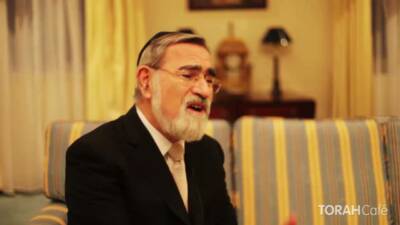Maimonides was a controversial figure in Jewish history because he combined two things that nobody had quite combined with such prowess before. On the one hand, he was an Ish Halachah, he was the greatest Rabbi of the Middle Ages, he wrote the greatest law code in all of Jewish history, the Mishneh Torah, he was an absolutely outstanding master halachist and a commentator on the Talmud and everything else.
At the same time, he also mastered what we call Chochmah, which is the universal wisdom of humankind, which we have in virtue of the fact that at the beginning of history, God made us each in his image, which Rashi defines as l’havin ulehaskil [Hebrew at 00:51]. God gave us the power to understand and discern. And that translated itself into two fundamental disciplines in Maimonides’ day, and still, to some extent, today: namely philosophy and science.
Maimonides was an absolute master at both of these things, at both science and philosophy. His first published work was on how to calculate the calendar. It was on astronomy. His second published work was Milot HaHiggayon, a Treatise on Logic. He knew the works of Aristotle and Plato and Islamic interpreters, and so on.
Now, Jews knew you could be one thing or another thing, but somebody who was both at the same time was quite perplexing to them. Occasionally, it would spill over into the kind of things Maimonides did. For instance, if you look at the Shulchan Aruch, the Code of Jewish Law written by Joseph Karo in the 16th century, it begins Aruch Chaim chapter one, paragraph one, about getting up in the morning. That’s the Jewish way, begin in the beginning, getting up in the morning.
The Rambam begins the Mishneh Torah not with getting up in the morning, but with the existence of God. In other words, Maimonides brought to bear the logical imagination, whereas Joseph Karo brought to bear the chronological imagination, where time begins, not where logic begins. This was all very unprecedented. Actually, nobody really followed the Rambam in this.
The Rambam includes at the beginning of his law code: Sefer Ha’Mada, which is all about physics and metaphysics, and said all sorts of things that no one had ever said before. The real irony, though, was that Rambam was accused of being a heretic, and in failing to believe certain normative Jewish beliefs. In particular, he was accused of not believing t’chiyat hameitim, the resurrection of the dead.
Now, I can’t begin to tell you how ironic this is. Number one, we wouldn’t even have a set of Jewish beliefs were it not for Maimonides. He wrote what has come to be known as the Yud Gimmel Ikkurim [Hebrew at 03:12], the Thirteen Principles of Jewish Faith, that you will find in the siddur at the back of the davening, and you will find in the siddur at the beginning of the davening in the poetic form called Yigdal. Yigdal is a poetic setting in the Rambam’s Thirteen Principles of Jewish Faith. To accuse him of lack of Jewish faith when he defined in the first place what Jewish faith is, is ironic.
Secondly, it is particularly ironic since every single place that he ever mentioned the Thirteen Principles of Jewish Faith included in them t’chiyat hameitim, faith in the resurrection of the dead. So, how they managed to accuse him of denying what he affirmed in all his writings, whenever he raised the matter, I don’t know. And yet, he still was forced in his lifetime to write a treatise called the Iggeret T’chiyat Hameitim, which he defended his belief in the resurrection of the dead.
So, it was ironic and it was foolish, but it was much worse than that. Because the truth is that when the Dominicans heard that the Jews regarded Maimonides as a heretic, they, in 1232, burned Maimonides’ writings. After all, if the Jews say they’re heresy, why shouldn’t we say they’re heresy and do the kind of thing you do with heretical stuff, which is get rid of it?
And then, thus emboldened, a mere eight years later, in 1240, they carried out one of the worst book burnings in history. And that is the reason why we have, for instance, no complete manuscript edition of the Talmud. And why all sorts of major Jewish works were lost forever. Some of them, thought to be lost, were eventually discovered in the Vatican library. They hadn’t mentioned this for 500 years, the commentaries of Me’iri [Hebrew 05:07], for instance.
So, it was very, very foolish and very disastrous what they did to Maimonides. And I really feel for him. Having been there a little bit myself, I realise that people condemn what they don’t understand. And I think we all need a little more humility than that.
In partnership with TorahCafe (www.torahcafe.com), Rabbi Lord Jonathan Sacks recorded a series of short videos in May 2013, in answer to some of the most frequently asked questions of Judaism (and faith in general).
SHARE
More from FAQs

What is Jewish leadership all about?
Question 12

Would the world be better without any religion?
Question 11

What is a Rabbi?
Question 10

Why do bad things happen to good people?
Question 9

What do Jews believe about the afterlife?
Question 8

What's the purpose of life?
Question 7

What does the term ‘Chosen People’ mean?
Question 6

If you could ask God one question, what would you ask?
Question 5

How can the belief in God be reconciled with science, especially evolution?
Question 4

How can the Torah be trusted?
Question 3

How do you know there is a God?
Question 2

What are the basic beliefs in Judaism?
Question One
